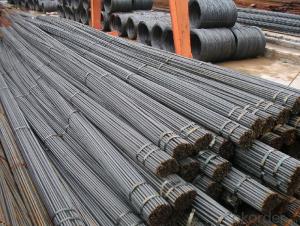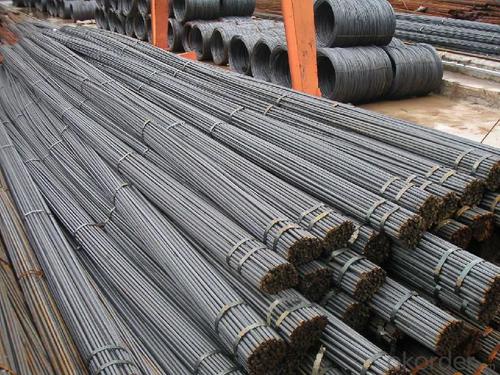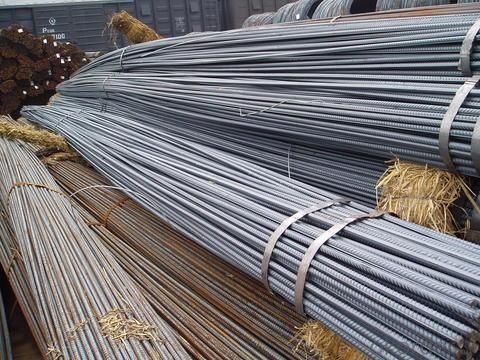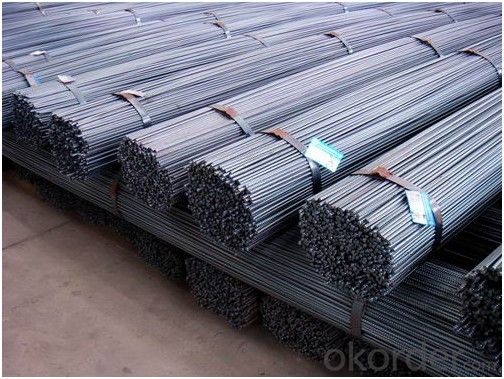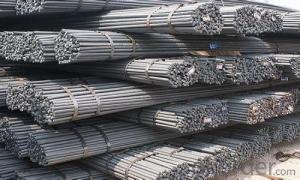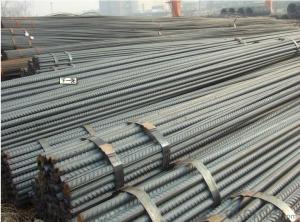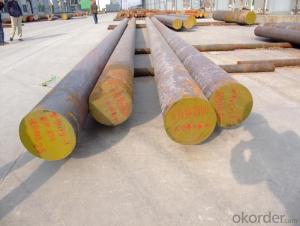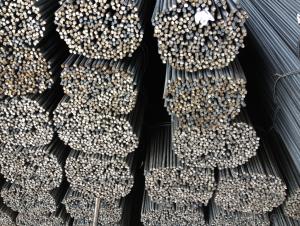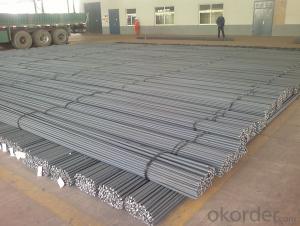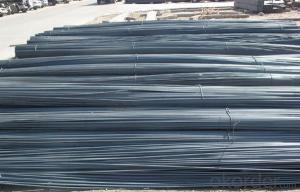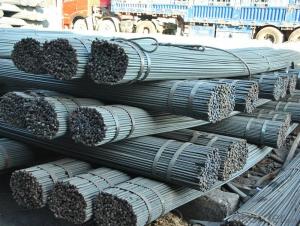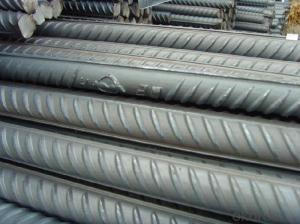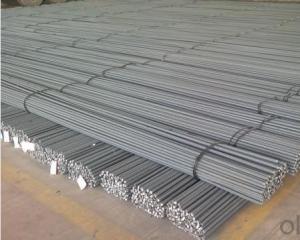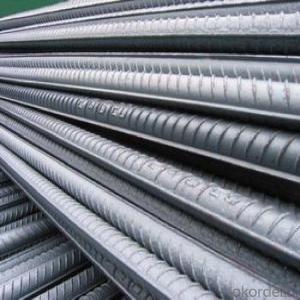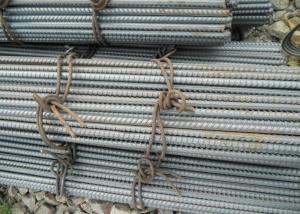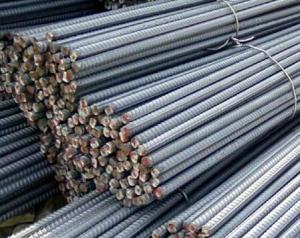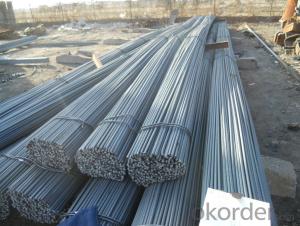Steel Rebar, Deformed Steel Bar, Iron Rods For Construction/Concrete Material
- Loading Port:
- Tianjin
- Payment Terms:
- TT or LC
- Min Order Qty:
- 30 m.t.
- Supply Capability:
- 40000 m.t./month
OKorder Service Pledge
OKorder Financial Service
You Might Also Like
Product Description:
OKorder is offering Steel Rebar, Deformed Steel Bar, Iron Rods For Construction/Concrete Material at great prices with worldwide shipping. Our supplier is a world-class manufacturer of steel, with our products utilized the world over. OKorder annually supplies products to European, North American and Asian markets. We provide quotations within 24 hours of receiving an inquiry and guarantee competitive prices.
Product Applications:
Steel Rebar, Deformed Steel Bar, Iron Rods For Construction/Concrete Material are ideal for structural applications and are widely used in the construction of buildings and bridges, and the manufacturing, petrochemical, and transportation industries.
Product Advantages:
OKorder's Steel Rebar, Deformed Steel Bar, Iron Rods For Construction/Concrete Material are durable, strong, and resist corrosion.
Main Product Features:
· Premium quality
· Prompt delivery & seaworthy packing (30 days after receiving deposit)
· Corrosion resistance
· Can be recycled and reused
· Mill test certification
· Professional Service
· Competitive pricing
Product Specifications:
Deformed bars/reinforced bars:
1.Material:GB--HRB400/HRB500 ; BS4449--460B/500B;
ASTM A615-Gr40/60 ; AS4671--500N/500E;
JISG3112--SD400 ; DIN488-1--BST500S;
KS-SD390.
2.Standard.:ASTM/JIS/DIN/BS/GB/KS.
3.Diameter:6-50mm.
The Specification of Deformed Steel Bars
| THEORETICAL WEIGHT INDEX | ||
| SIZE(mm) | CUT AREA(cm2) | THEORETICAL WEIGHT(kg/m) |
| 8 | 0.503 | 0.395 |
| 9 | 0.636 | 0.5 |
| 10 | 0.79 | 0.62 |
| 12 | 1.13 | 0.89 |
| 14 | 1.54 | 1.21 |
| 16 | 2.01 | 1.58 |
| 18 | 2.55 | 2 |
| 20 | 3.14 | 2.47 |
| 22 | 3.8 | 2.98 |
| 25 | 4.91 | 3.85 |
| 28 | 6.16 | 4.83 |
| 32 | 8.04 | 6.31 |
| Grade | Technical data of the original chemical composition(%) | ||||||||
| C | Mn | Si | S | P | B | ||||
| HRB335 | ≤ 0.25 | ≤ 1.60 | ≤ 0.80 | ≤ 0.045 | ≤ 0.045 | >0.0008 | |||
| Physics capability | |||||||||
| Yield Strength(N/cm 2 ) | Tensile Strength(N/cm 2 ) | Elongation (%) | |||||||
| ≥ 335 | ≥ 490 | ≥ 16 | |||||||
| Grade | Technical data of the original chemical composition (%) | |||||
| C | Mn | Si | S | P | V | |
| HRB400 | ≤0.25 | ≤1.60 | ≤ 0.80 | ≤ 0.045 | ≤ 0.045 | 0.04-0.12 |
| Physics capability | ||||||
| Yield Strength ( N/cm 2 ) | Tensile Strength ( N/cm 2 ) | Elongation (%) | ||||
| ≥ 400 | ≥570 | ≥ 14 | ||||
FAQ:
Q1: Why buy Materials & Equipment from OKorder.com?
A1: All products offered byOKorder.com are carefully selected from China's most reliable manufacturing enterprises. Through its ISO certifications, OKorder.com adheres to the highest standards and a commitment to supply chain safety and customer satisfaction.
Q2: How do we guarantee the quality of our products?
A2: We have established an advanced quality management system which conducts strict quality tests at every step, from raw materials to the final product. At the same time, we provide extensive follow-up service assurances as required.
Q3: How soon can we receive the product after purchase?
A3: Within three days of placing an order, we will begin production. The specific shipping date is dependent upon international and government factors, but is typically 7 to 10 workdays.
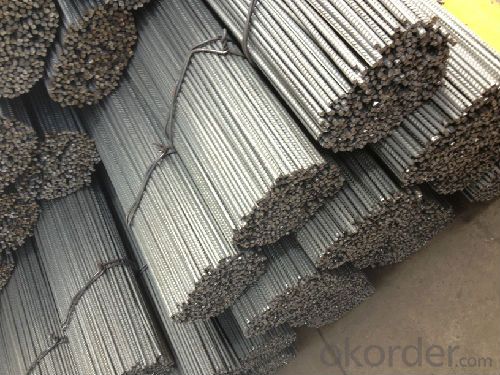
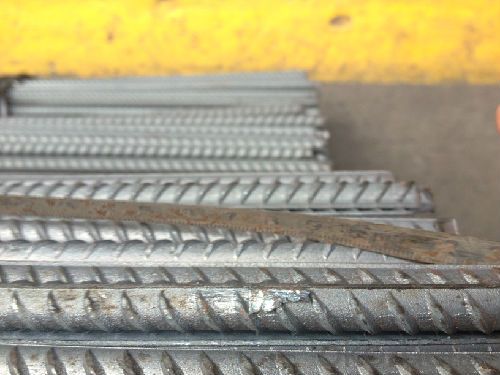
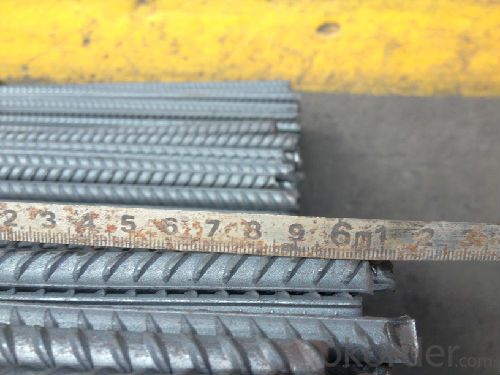
- Q: How are steel rebars marked for identification on construction sites?
- Steel rebars are typically marked for identification on construction sites using a variety of methods. The most common method is through the use of tags or labels that are attached to the rebars. These tags often contain important information such as the diameter, grade, and length of the rebar, as well as any additional specifications or codes that may be required. In addition to tags, rebars may also be marked using paint or ink. This can be done by either spraying or stenciling the required information directly onto the surface of the rebar. Paint or ink markings are often used for temporary identification purposes or when tags are not feasible. Another method of marking rebars is through the use of colored plastic or vinyl caps. These caps are placed on the ends of the rebars and are typically color-coded to indicate various characteristics such as the size or type of rebar. This method allows for quick and easy visual identification on the construction site. It is important to note that the specific method of marking rebars may vary depending on local regulations, project requirements, or the preferences of the construction company or engineer. The goal of these markings is to ensure that rebars can be easily identified and sorted during construction, helping to ensure proper installation and adherence to design specifications.
- Q: What are the main characteristics of steel rebars?
- The main characteristics of steel rebars include high strength, durability, corrosion resistance, and flexibility. They are commonly used in reinforced concrete structures to reinforce and provide tensile strength to the concrete.
- Q: Can steel rebars be used in structures with high levels of carbonation or acid attack?
- No, steel rebars should not be used in structures with high levels of carbonation or acid attack. Steel is susceptible to corrosion in acidic environments, and high carbonation levels can increase the acidity of the surroundings. In such conditions, alternative materials that are resistant to corrosion and acid attack, such as stainless steel or fiber-reinforced polymers, should be considered for structural reinforcement.
- Q: How do steel rebars affect the overall cost of maintenance and repairs?
- Steel rebars can have a significant impact on the overall cost of maintenance and repairs in various structures. Firstly, steel rebars are commonly used to reinforce concrete structures such as buildings, bridges, and highways. These rebars provide strength and durability to the concrete, helping to prevent cracks and structural failures. When it comes to maintenance, steel rebars can play a crucial role in reducing the frequency and costs of repairs. By reinforcing the concrete, rebars help to distribute stress and load evenly, minimizing the chances of structural damage. This means that maintenance and repair works will be less frequent, saving both time and money for property owners or infrastructure managers. Moreover, steel rebars also contribute to the longevity of structures. By preventing cracks and other forms of damage, rebars help to extend the lifespan of the concrete. This reduces the need for costly and extensive repairs or even the complete replacement of the structure in the long run. However, it is important to note that steel rebars may also require maintenance themselves. Over time, rebars can corrode due to exposure to moisture, chemicals, or environmental factors. This corrosion can weaken the rebars and compromise the integrity of the structure. Therefore, periodic inspection and maintenance of the rebars are necessary to prevent any potential issues. In conclusion, steel rebars have a significant impact on the overall cost of maintenance and repairs. While they contribute to the strength and durability of structures, reducing the need for frequent repairs, they also require their own maintenance to prevent corrosion. Properly maintained steel rebars can help to extend the lifespan of structures and save costs in the long term.
- Q: What are the different types of couplers used for connecting steel rebars?
- There are several types of couplers used for connecting steel rebars, including mechanical couplers, lap splices, and grouted splices. Mechanical couplers are typically threaded or tapered and provide a mechanical connection between the rebars. Lap splices involve overlapping the rebars and securing them with tie wires or welding. Grouted splices involve placing the rebars in a sleeve or coupling filled with grout to create a bonded connection.
- Q: What are the different types of supports used for steel rebars in formwork?
- There are several different types of supports that can be used for steel rebars in formwork. Some common examples include chairs, spacers, bolsters, and hangers. These supports are designed to provide stability and ensure proper positioning of the rebars during concrete pouring and curing processes.
- Q: How are steel rebars affected by chemical exposure?
- Steel rebars are generally resistant to chemical exposure due to their high corrosion resistance. However, certain aggressive chemicals, such as acids or chlorides, can corrode steel rebars over time. This corrosion can weaken the rebars, compromising the structural integrity of the reinforced concrete. Therefore, it is important to protect steel rebars from prolonged exposure to corrosive chemicals to ensure their long-term durability.
- Q: What is the cost-effectiveness of using steel rebars?
- The cost-effectiveness of using steel rebars is generally considered to be high. Steel rebars provide strength and durability to reinforced concrete structures, making them a popular choice in construction. One of the key advantages of steel rebars is their long lifespan, which reduces the need for frequent repairs or replacements. This can result in significant cost savings over time, as the initial investment in steel rebars can be recouped through their extended service life. Additionally, steel rebars are readily available and have a comparatively low cost compared to alternative reinforcement materials, such as carbon fiber or fiberglass. This makes steel rebars a cost-effective choice for a wide range of construction projects. Moreover, steel rebars offer excellent tensile strength, allowing them to withstand heavy loads and seismic forces. By reinforcing concrete structures with steel rebars, the risk of structural failure or collapse is significantly reduced. This can lead to additional cost savings by minimizing the need for costly repairs or reconstruction in the event of a disaster. Furthermore, steel rebars are versatile and can be easily fabricated and customized to suit specific project requirements. This versatility allows for efficient installation and reduces labor costs, further enhancing the cost-effectiveness of using steel rebars. In conclusion, the cost-effectiveness of using steel rebars is high due to their long lifespan, comparatively low cost, excellent tensile strength, and versatility. By choosing steel rebars as a reinforcement material, construction projects can benefit from reduced maintenance and repair costs, improved structural integrity, and overall long-term savings.
- Q: What is the maximum allowable percentage of rust on steel rebars?
- The maximum allowable percentage of rust on steel rebars is typically 5%. However, this may vary depending on specific industry standards and project requirements.
- Q: How do steel rebars affect the overall flexibility of concrete structures?
- Steel rebars significantly enhance the overall flexibility of concrete structures. By reinforcing the concrete, rebars increase its resistance to tensile forces, which is crucial in preventing cracks and failures. This added flexibility ensures that the structure can withstand various external loads and environmental conditions without compromising its integrity.
Send your message to us
Steel Rebar, Deformed Steel Bar, Iron Rods For Construction/Concrete Material
- Loading Port:
- Tianjin
- Payment Terms:
- TT or LC
- Min Order Qty:
- 30 m.t.
- Supply Capability:
- 40000 m.t./month
OKorder Service Pledge
OKorder Financial Service
Similar products
Hot products
Hot Searches
Related keywords
